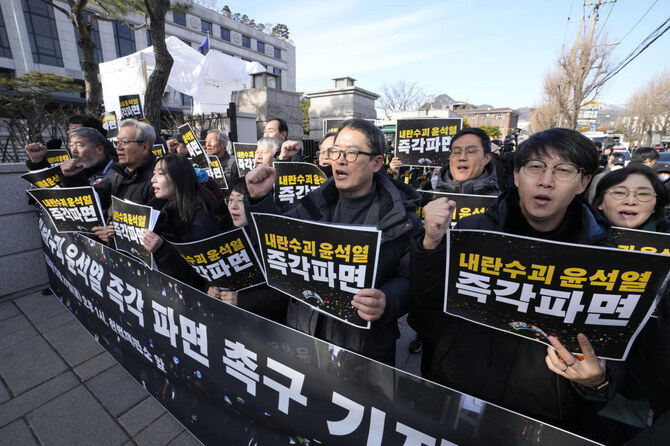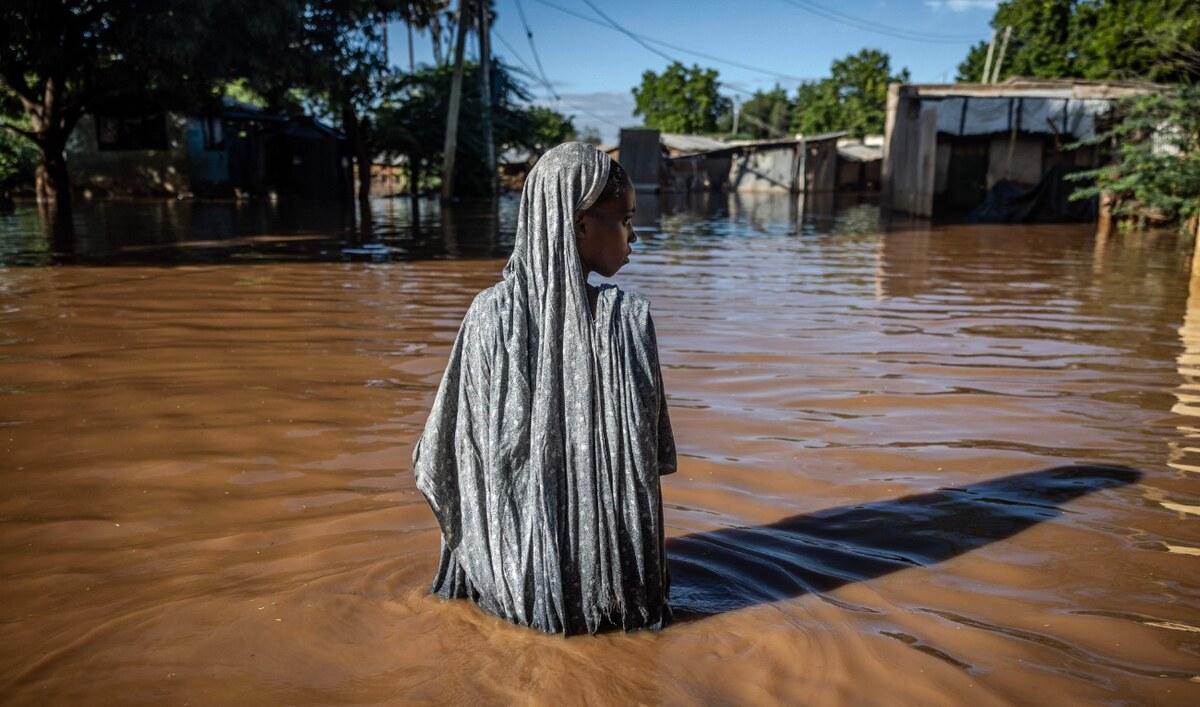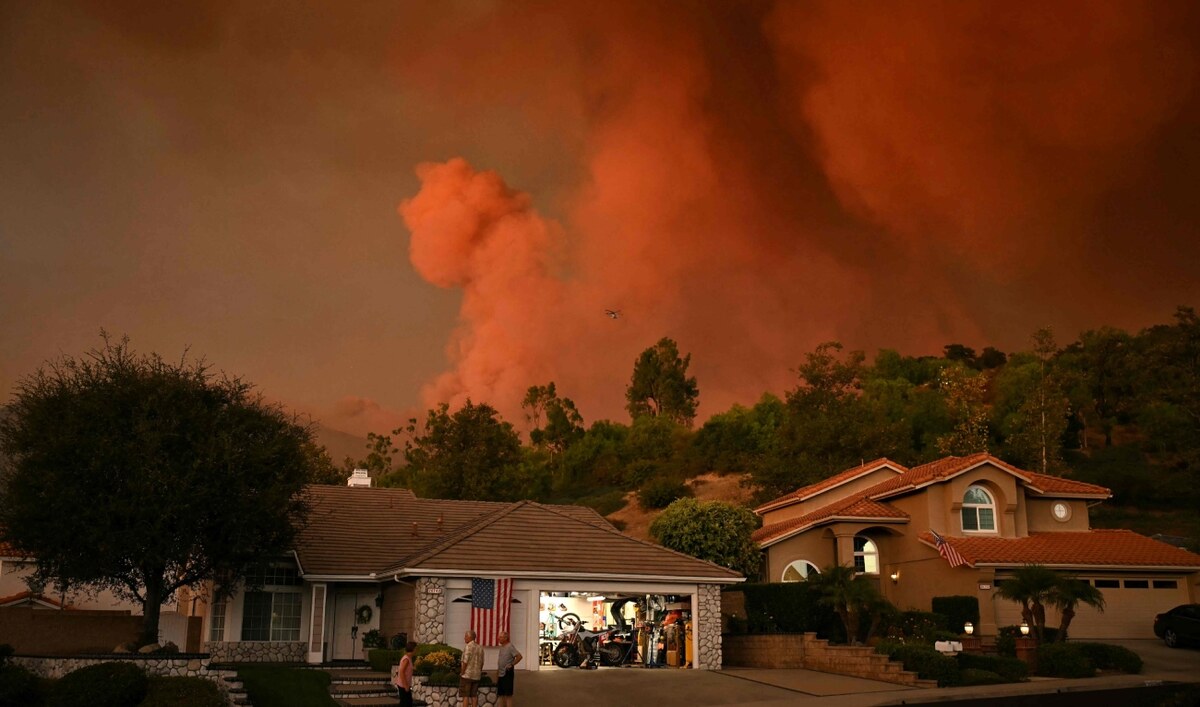WASHINGTON: Michael Flynn has “a story to tell,” his lawyer said Thursday, amid reports that the ousted US national security adviser has offered to testify in exchange for immunity about potential ties between Donald Trump’s presidential campaign and Russia.
Flynn proposed his deal to the Federal Bureau of Investigation and the House and Senate intelligence committees, The Wall Street Journal reported late Thursday.
A close adviser of Trump’s 2016 campaign, Flynn was forced to step down just weeks into the security job last month.
His resignation came after it emerged that he made misleading statements about talks he held with Russian Ambassador Sergey Kislyak during the presidential transition concerning Washington’s sanctions on Moscow.
Trump himself appeared to offer legal advice on the issue, tweeting: “Mike Flynn should ask for immunity in that this is a witch hunt (excuse for big election loss), by media & Dems, of historic proportion!“
The Journal said it wasn’t clear what exactly Flynn had offered to discuss.
But it quoted one unnamed official as saying the retired army general’s bid for immunity suggested potential “legal jeopardy” for him.
Robert Kelner, a lawyer for Flynn, said in a statement tweeted late Thursday that “General Flynn certainly has a story to tell, and he very much wants to tell it, should the circumstances permit.
“Out of respect for the committees, we will not comment right now on the details of discussions between counsel for General Flynn and the House and Senate intelligence committees, other than to confirm that those discussions have taken place,” the lawyer added.
The New York Times quoted a congressional official as saying investigators are wary of cutting a deal with Flynn until they are further along in their probe and have a better idea of what information Flynn might offer.
The Times also quoted an expert as urging caution over Flynn’s offer of testimony.
“At this early stage, I wouldn’t read anything into this request beyond smart lawyering,” Mark Zaid, a Washington lawyer specializing in national security cases, was quoting as saying by the Times.
“In such a politically charged, high-profile national security case, I couldn’t imagine not first asking for immunity,” he added.
“I would suspect both Congress and the FBI will first generate additional evidence from smaller players before deciding to immunize General Flynn,” Zaid said, according to the Times.
At least four investigations are under way into allegations that Moscow tried to swing November’s presidential election in Trump’s favor, as questions swirl about whether some in the Republican’s inner circle colluded with Russia.
The FBI, in an extraordinary admission, confirmed publicly this month that it was probing the possibility of such collusion.
A former US military intelligence chief, Flynn was generously paid to attend a gala of Russia’s RT television in late 2015, where he sat with President Vladimir Putin, raising suspicions about his ties with Moscow.
His ouster came amid controversy over his discussions with Kislyak in late December, when the Obama administration was hitting Russia with retaliatory sanctions and expulsions for its election interference.
Trump has said he did not instruct Flynn to speak with the Russian ambassador. However, Trump defended the move, saying it was the kind of thing a national security adviser would do as part of his job.
Flynn’s actions came before Trump’s inauguration, when Barack Obama was still president. And a rarely-invoked US law bars private citizens from engaging in foreign policy on behalf of the government.
Soon after Flynn resigned, US Attorney General Jeff Sessions recused himself from any Russia-related inquiries, following the revelation that he, too, also met with Kislyak before Trump took office — contrary to his testimony during his confirmation hearing before the Senate.
Ex-Trump adviser Flynn offers testimony for immunity: report
Ex-Trump adviser Flynn offers testimony for immunity: report

South Korea’s parliament impeaches acting president Han Duck-soo

- The motion led by opposition parties passed with 192 of the 300 votes amid rowdy scenes by ruling People Power Party members
SEOUL: South Korea’s parliament impeached acting President Han Duck-soo on Friday over a short-lived martial law, plunging the country deeper into political chaos, as the Constitutional Court said it would swiftly trial suspended President Yoon Suk Yeol.
The impeachment of Han, who has been acting president since Yoon was impeached on Dec. 14 for declaring martial law on Dec. 3, has thrown South Korea’s once-vibrant democratic success story into uncharted territory.
The motion led by opposition parties passed with 192 of the 300 votes amid rowdy scenes by ruling People Power Party members who surrounded the speaker’s podium chanting the vote was invalid and parliament had committed “tyranny.”
Ahead of the parliamentary session, opposition leader Lee Jae-myung said his Democratic Party, which has majority control of parliament, will go ahead with the plan to impeach the acting president, accusing Han of “acting for insurrection.”
“The only way to normalize the country is to swiftly root out all the insurrection forces,” Lee said in a fiery speech, adding the party was acting on the public order to eradicate those who have put the country at risk.
There has been overwhelming public support for Yoon’s removal, according to opinion polls conducted after his martial law attempt.
The plan for a vote to impeach Han was unveiled on Thursday by the main opposition Democratic Party after he declined to immediately appoint three justices to fill vacancies at the Constitutional Court, saying it would exceed his acting role.
Until just before voting began, it was unclear how many votes were needed to impeach Han as acting leader. The threshold for a prime minister is a simple majority, while a two-thirds majority is needed for a president.
Speaker Woo Won-shik declared a simple majority would constitute parliamentary approval.
Han said in a statement after the vote that he would step aside to avoid more chaos and will await a Constitutional Court ruling on his impeachment.
By law Finance Minister Choi Sang-mok will assume the acting presidency.
Choi earlier pleaded with parliament to withdraw the plan to impeach Han, saying it would do serious damage to the country’s economy.
The South Korean won retreated to 1,475.4 per dollar, down 0.53 percent at 0707 GMT ahead of the parliamentary vote.
The vote to determine Han’s fate comes on the same day the Constitutional Court held its first hearing in a case reviewing whether to overturn the impeachment and reinstate Yoon or remove him permanently from office. It has 180 days to reach a decision.
North Korean soldier captured in Ukraine died from injuries – South Korea’s spy agency

- The soldier was captured by the Ukrainian army
- Location where he was seized was unknown
SEOUL: South Korea’s spy agency said Friday it had confirmed that a North Korean soldier sent to back Russia’s war against Ukraine had been captured by Ukrainian forces.
Pyongyang has deployed thousands of troops to reinforce Russian troops, including in the Kursk border region where Ukraine mounted a shock border incursion in August.
“Through real-time information sharing with an allied country’s intelligence agency, it has been confirmed that one injured North Korean soldier has been captured,” South Korea’s National Intelligence Service said in a statement.
The soldier was captured by the Ukrainian army, an intelligence source told AFP, adding that the location where he was seized was unknown.
The first confirmation of the capture of a North Korean soldier came days after Ukrainian President Volodymyr Zelensky said Monday that nearly 3,000 North Korean soldiers had been “killed or wounded” so far.
Seoul’s Joint Chiefs of Staff (JCS) also said Monday that more than 1,000 North Korean soldiers have been killed or wounded.
The JCS had also said that Pyongyang is reportedly “preparing for the rotation or additional deployment of soldiers” and supplying “240mm rocket launchers and 170mm self-propelled artillery” to the Russian army.
Seoul’s military believes that North Korea was seeking to modernize its conventional warfare capabilities through combat experience gained in the Russia-Ukraine war.
North Korean state media said Friday that Russian President Vladimir Putin sent a New Year’s message to North Korean leader Kim Jong Un, saying “the bilateral ties between our two countries have been elevated after our talks in June in Pyongyang.”
A landmark defense pact went into effect in December after the two sides exchanged ratification documents.
Putin hailed the deal in June as a “breakthrough document.”
‘Dangerous new era’: climate change spurs disaster in 2024

- This year was hottest in history, with record-breaking temperatures in atmosphere, oceans acting like fuel for extreme weather
- World Weather Attribution said nearly every disaster they analyzed over the past 12 months was intensified by climate change
PARIS: From tiny and impoverished Mayotte to oil-rich behemoth Saudi Arabia, prosperous European cities to overcrowded slums in Africa, nowhere was spared the devastating impact of supercharged climate disasters in 2024.
This year is the hottest in history, with record-breaking temperatures in the atmosphere and oceans acting like fuel for extreme weather around the world.
World Weather Attribution, experts on how global warming influences extreme events, said nearly every disaster they analyzed over the past 12 months was intensified by climate change.
“The impacts of fossil fuel warming have never been clearer or more devastating than in 2024. We are living in a dangerous new era,” said climate scientist Friederike Otto, who leads the WWA network.
That was tragically evident in June when more than 1,300 people died during the Muslim Hajj pilgrimage in Saudi Arabia where temperatures hit 51.8 degrees Celsius (125 degrees Fahrenheit).
Extreme heat — sometimes dubbed the ‘silent killer’ — also proved deadly in Thailand, India, and United States.
Conditions were so intense in Mexico that howler monkeys dropped dead from the trees, while Pakistan kept millions of children at home as the mercury inched above 50C.

Greece recorded its earliest ever heatwave, forcing the closure of its famed Acropolis and fanning terrible wildfires, at the outset of Europe’s hottest summer yet.
Climate change isn’t just sizzling temperatures — warmer oceans mean higher evaporation, and warmer air absorbs more moisture, a volatile recipe for heavy rainfall.
In April, the United Arab Emirates received two years worth of rain in a single day, turning parts of the desert-state into a sea, and hobbling Dubai’s international airport.
Kenya was barely out of a once-in-a-generation drought when the worst floods in decades delivered back-to-back disasters for the East African nation.

Four million people needed aid after historic flooding killed more than 1,500 people across West and Central Africa. Europe — most notably Spain — also suffered tremendous downpours that caused deadly flash flooding.
Afghanistan, Russia, Brazil, China, Nepal, Uganda, India, Somalia, Pakistan, Burundi and the United States were among other countries that witnessed flooding in 2024.
Warmer ocean surfaces feed energy into tropical cyclones as they barrel toward land, whipping up fierce winds and their destructive potential.
Major hurricanes pummelled the United States and Caribbean, most notably Milton, Beryl and Helene, in a 2024 season of above-average storm activity.
The Philippines endured six major storms in November alone, just two months after suffering Typhoon Yagi as it tore through Southeast Asia.
In December, scientists said global warming had helped intensify Cyclone Chino to a Category 4 storm as it collided head-on with Mayotte, devastating France’s poorest overseas territory.
Some regions may be wetter as climate change shifts rainfall patterns, but others are becoming drier and more vulnerable to drought.
The Americas suffered severe drought in 2024 and wildfires torched millions of hectares in the western United States, Canada, and the Amazon basin — usually one of Earth’s wettest places.
Between January and September, more than 400,000 fires were recorded across South America, shrouding the continent in choking smoke.

The World Food Programme in December said 26 million people across southern Africa were at risk of hunger as a months-long drought parched the impoverished region.
Extreme weather cost thousands of lives in 2024 and left countless more in desperate poverty. The lasting toll of such disasters is impossible to quantify.
In terms of economic losses, Zurich-based reinsurance giant Swiss Re estimated the global damage bill at $310 billion, a statement issued early December.
Flooding in Europe — particularly in the Spanish province of Valencia, where over 200 people died in October — and hurricanes Helene and Milton drove up the cost, the company said.
As of November 1, the United States had suffered 24 weather disasters in 2024 with losses exceeding $1 billion each, government figures showed.
Drought in Brazil cost its farming sector $2.7 billion between June and August, while “climatic challenges” drove global wine production to its lowest level since 1961, an industry body said.
Court hearing set for man accused of fatally burning woman on New York City subway

- Sebastian Zapeta, a Guatemalan citizen who entered the US illegally, has been jailed at the city’s Rikers Island complex
- Authorities say Zapeta approached the woman and set her clothing on fire with a lighter, then sat on a bench and watched as she burned
NEW YORK: A court hearing is scheduled Friday for the man accused of setting a woman on fire on a New York City subway train and fanning the flames with a shirt as she burned to death.
Sebastian Zapeta has been charged with two counts of murder and one count of arson for the apparently random attack, which occurred early Sunday morning on a train stopped in Brooklyn.
The 33-year-old man made his first court appearance earlier in the week. He was not required to enter a plea, and his attorney has not responded to requests for comment.
The victim has not yet been publicly identified by police.
Zapeta, who federal immigration officials said is a Guatemalan citizen who entered the US illegally, has been jailed at the city’s Rikers Island complex.
Authorities say Zapeta approached the woman, who might have been sleeping on the train at the Coney Island station stop, and set her clothing on fire with a lighter. He waved a shirt at her to fan the fire, causing her to become engulfed in flames, prosecutor Ari Rottenberg said during the court appearance Tuesday.
Zapeta then sat on a bench on the platform and watched as she burned, prosecutors allege. The woman was pronounced dead at the scene.
Police took Zapeta into custody while he was riding a train on the same line later that day.
Zapeta told investigators that he drinks a lot of liquor and did not know what had happened, according to Rottenberg. However, Zapeta did identify himself in photos and surveillance video showing the fire being lit, the prosecutor said.
A Brooklyn address for Zapeta released by police after his arrest matches a shelter that provides housing and substance abuse support.
Federal immigration officials said he was deported in 2018 but returned to the US illegally sometime after that.
India announces state funeral for ex-PM Manmohan Singh

- Manmohan Singh, who held office from 2004 to 2014, died at the age of 92 late Thursday evening at a hospital in New Delhi
- The official date for the funeral was not announced, but a member of Congress party suggested it would be held on Saturday
NEW DELHI: India on Friday announced seven days of state mourning after the death of former Prime Minister Manmohan Singh, one of the architects of the country’s economic liberalization in the early 1990s.
Singh, who held office from 2004 to 2014, died at the age of 92 late Thursday evening at a hospital in New Delhi. He will also be accorded a state funeral.
“As a mark of respect for the departed dignitary, it has been decided that seven days of state mourning will be observed throughout India,” the Indian government said in a statement Friday, with mourning running until January 1.
“It has also been decided that the state funeral will be accorded to late Dr. Manmohan Singh,” it said, adding that the national flag will also be flown at half-mast.
India’s cricket team battling hosts Australia in the fourth Test took to the ground Friday with black arm bands to show respect for Singh.
The official date for the state funeral was not immediately announced, but a senior member of the Congress party suggested it would be held on Saturday.
The former premier was an understated technocrat who was hailed for overseeing economic boom in Asia’s fourth-largest economy in his first term but his second stint ended with a series of major corruption scandals, slowing growth, and high inflation.
The unpopularity of Singh in his second term, and a lacklustre leadership by Nehru-Gandhi scion Rahul Gandhi, the current leader of opposition in the lower house, led to the first landslide victory for Prime Minister Narendra Modi in 2014.
Born in 1932 in the mud-house village of Gah, in what is now Pakistan, Singh studied economics to find a way to eradicate poverty in the vast nation and never held elected office before taking the nation’s highest office.
He won scholarships to attend both Cambridge, where he obtained a first in economics, and Oxford, where he completed his doctorate.
Singh worked in a string of senior civil service posts, served as a central bank governor and also held various jobs with global agencies such as the United Nations.
He was tapped in 1991 by then Congress prime minister P.V. Narasimha Rao to reel India back from the worst financial crisis in its modern history
In his first term Singh steered the economy through a period of nine-percent growth, lending the country the international clout it had long sought.
He also sealed a landmark nuclear deal with the US that he said would help India meet its growing energy needs.

















